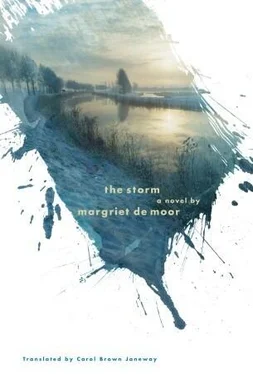“What? I didn’t quite understand you. Another person?”
“Someone who’s spent my whole life looking and listening with me. In some way, a great advantage. So my sister who lives hidden inside me is older than I am, but still a lot less forgetful. Beautiful moments that I’ve lived, even if they’ve faded, shine on a little longer through her. Did you come, I ask her now, to say good-bye or to fetch me? That well-known look of till-death-us-do-part meets mine, even if it’s a little frostier than it used to be. The face is blue, which occurs when the oxygen content of the blood drops below the critical point and death is very close. As it happens, I’m an expert on this. All the same, oddly, as long as I live, I automatically keep her, my moribund other, alive.”
“Classic thought, sympathetic too! Tell me, are you lying comfortably?”
“Very comfortably. Now that I’m nothing but skin and bone, they’ve laid a sheepskin on my mattress. It’s delightfully warm in the room. I’m very tired already, and I just peek out through the slits in my eyelids. I have almost no eyelashes left, which means that though I’m half hallucinating, I’m spared spiders and beetles. I think about whatever comes into my head: a conversation from years back about your last moments. How they may have looked. The Dutch Institute of Forensic Medicine was still in Rijswijk then. No idea why, but I feel more comforted now by my gravity and my grief back then than I did at the time. A pathologist like that knows a great deal. A great sense of peace emanated from him while he explained to me quite calmly the actual process of your drowning. He had gray eyes with such heavy lids and a lethargic twinkle, but you imagined that already. On the table between us, the photo with your face and your absurd laugh. Surprisingly, he couldn’t answer my first questions, namely whether you had gone on shivering underwater, since your body temperature had already dropped so hellishly, and whether your teeth went on chattering, the way a body always does instinctively to generate a last bit of warmth. I know it was crazy and pointless to ask, but he didn’t know.”
“Oh, well, I still shiver like crazy, even though I’m unconscious.”
“The doctor, who saw I was fighting back tears, reassured me that you can have suffered only for a minute or two. The specific weight of a human body is higher than the specific weight of water, but not much, a little movement and the person keeps swimming. A small reserve of air in the lungs is not bad, of course, screaming and calling out aren’t sensible, and I assume you didn’t do it anyway out of sheer exhaustion. A great disadvantage was apparently that there was no more air between you and your sodden clothes, so I assume that you sank immediately.”
“True.”
“How hopeless water is! It siphons off your body heat twenty-six times faster than air at the same temperature. Twenty-six times! So is it realistic to demand that your heart keep beating normally when you’re in water that’s thirty-six to thirty-seven degrees Fahrenheit? That your brain keep thinking normally when it’s cooling down at that speed? After ninety seconds, even your most rational reflexes are completely disrupted. What are you supposed to do with your nose and mouth underwater, breathe or not breathe? That was your only moment of despair. In the grip of a great lack of oxygen, your instinct finally said yes. A large gulp of water met the opening of your respiratory tract.”
“That’s right, and the respiratory tract rejected it. I can tell you, Armanda, that if your friend the pathologist were to open up my poor drowned body, he wouldn’t find a single drop of seawater in my lungs. Sometimes the larynx is so shocked by the passage of water over the vocal cords that it angrily contracts all the muscles to block it. That’s what happened with me. For a moment I was panicked. Shame, shame, shame, I thought, I really wanted to try that recipe for pancakes with the little bits of ginger stirred in under the batter. I felt a hellish pain, as if my head were being squeezed together by a muscular hand, and wanted to cry out, which of course I couldn’t do. Yes, yes, so where are they, the sun-flooded fields of tulips at the end of the tunnel you always hear about in connection with drowning, I thought furiously, and I hadn’t even finished the thought when I noticed that the pain was gone. I opened my eyes. You cannot imagine, child, how beautiful the colder, more temperate sea under the surface of the water is! It’s a well-worn cliché that what you think of as you’re dying is flying away, upward, but in my opinion, heading downward is a lot easier. You weigh so little, at the end, don’t you? At this moment my poor body, head downward, is spiraling toward the bottom of the Oosterschelde. My heart has already stopped beating, there’s no more pulse, but deep in my brain there’s still life. If your doctor were to thrust a thermometer through the top of my skull, he’d establish the temperature in there was still at least eighty-two degrees Fahrenheit.
“Suspended animation. You dream, your thinking has become totally insane. And yet, if someone were to fish you out right away and really get you warm again, you could still make it. Cold, which works so that your organs need a minimum of oxygen, like a hibernating polar bear’s, is a real advantage when considered from the standpoint of a rescue.”
“God forbid! If you could see what I see…. I had already read in the Seegeranie Foundation’s quarterly that the underwater area around Schelphoek in front of the coast of Schouwen could stand comparison with any tropical aquarium. I have to say the editors were right. Whole forests of pale blue sea anemones, lilac, and yellow trumpets and red and yellow tubiflora waved to and fro like curtains in the undertow between the streams and the sandbanks. Most of us, Armanda, think that fish just swim. In the position I find myself occupying, I see dozens of speckled examples with teeth and horns, staring fixedly, and doing exactly that. But right in front of me are two enormous lumpsuckers with upstretched yellow chins, kissing. Incredible creatures! Meanwhile I’m moving slowly across the seabed. A powerful undertow will pull me into the silt there, which in turn will deliver me the following week to the marshy bottom behind the remains of the destroyed dike, where my body will find a resting place for at least thirty years. I think about my family. Odd, that I can only see their faces in such a blurred way.
“A few men, a few women, a few children, farewell! Whether I chose you or whether you were assigned to me, I somehow felt I was in the right place. At this moment I discover, quite soberly, that it’s actually true what writers and prophets have been saying for thousands of years: in that other world, so close that all you need to do is stretch out a finger, you will find those again whom you want to find again, and moreover they will be — because otherwise what would be the point, you know? — remarkably well disposed toward you. Now that my soul is leaving my mouth in the form of a butterfly, just the way we saw it in the Allard Pierson Museum on one of those red-figured Greek vases, I recognize your face. Oval, with a round chin. Your smile confirms my hope that we’re going to start telling each other stories right away.”
“Oh, yes!”
“It turns out better than expected, huh?”
“Yes, no big job.”
“No. Quite easy, actually.”
“Or?”
“Mmmm.”
“Oh, you’re asleep!”
“Am not!”
“Really?”
“Ab-so-lutely not!”
Born in the Netherlands in 1941, Margriet de Moor led a career as a classical singer before becoming a novelist. Her first novel, First Gray, Then White, Then Blue , was a sensational success across Europe, winning her the AKO Literature Prize, for which her second novel, The Virtuoso , was also nominated. She has since published several other novels, including Duke of Egypt and The Kreutzer Sonata . Her books have been translated into twenty languages.












